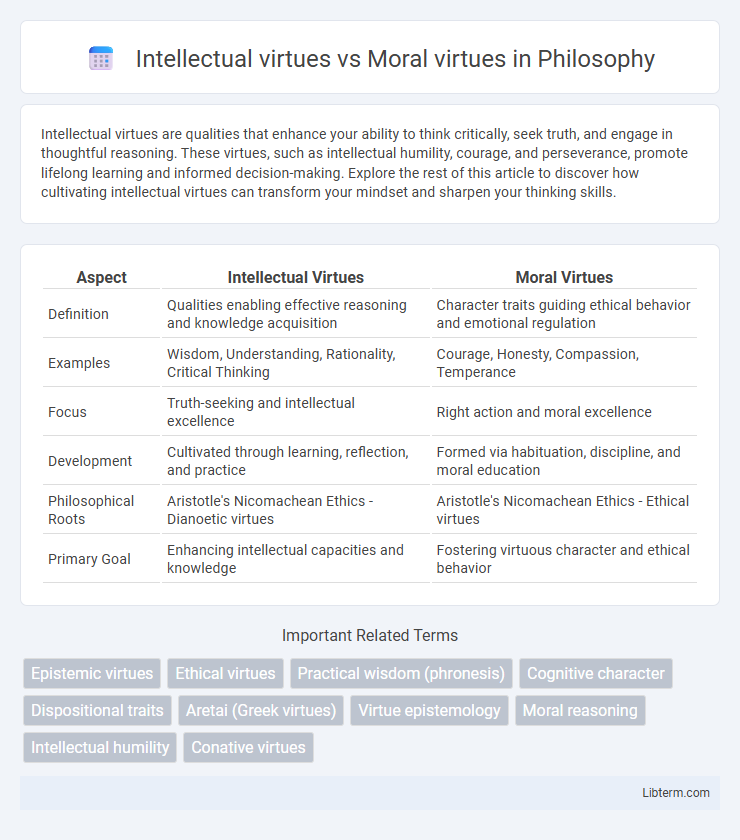Intellectual virtues are qualities that enhance your ability to think critically, seek truth, and engage in thoughtful reasoning. These virtues, such as intellectual humility, courage, and perseverance, promote lifelong learning and informed decision-making. Explore the rest of this article to discover how cultivating intellectual virtues can transform your mindset and sharpen your thinking skills.
Table of Comparison
| Aspect | Intellectual Virtues | Moral Virtues |
|---|---|---|
| Definition | Qualities enabling effective reasoning and knowledge acquisition | Character traits guiding ethical behavior and emotional regulation |
| Examples | Wisdom, Understanding, Rationality, Critical Thinking | Courage, Honesty, Compassion, Temperance |
| Focus | Truth-seeking and intellectual excellence | Right action and moral excellence |
| Development | Cultivated through learning, reflection, and practice | Formed via habituation, discipline, and moral education |
| Philosophical Roots | Aristotle's Nicomachean Ethics - Dianoetic virtues | Aristotle's Nicomachean Ethics - Ethical virtues |
| Primary Goal | Enhancing intellectual capacities and knowledge | Fostering virtuous character and ethical behavior |
Defining Intellectual Virtues
Intellectual virtues are cognitive character traits that promote effective reasoning, understanding, and truth-seeking, distinct from moral virtues which govern ethical behavior and character. Examples of intellectual virtues include open-mindedness, intellectual humility, intellectual courage, and intellectual perseverance, all essential for critical thinking and knowledge acquisition. These virtues enhance intellectual inquiry by fostering honest reflection, rigorous analysis, and the pursuit of evidence-based conclusions.
Understanding Moral Virtues
Moral virtues, such as honesty, courage, and compassion, are character traits developed through habitual practice that guide ethical behavior and decision-making. Unlike intellectual virtues, which cultivate skills like critical thinking and knowledge acquisition, moral virtues emphasize emotional intelligence and the capacity to regulate desires and emotions in social contexts. Understanding moral virtues involves recognizing their role in shaping a person's character and fostering harmonious relationships within communities.
Historical Perspectives: Philosophers on Virtue
Aristotle distinguished intellectual virtues, such as wisdom and understanding, as the qualities developed through teaching and experience, while moral virtues like courage and temperance arise from habit and practice. Aquinas extended this view by integrating intellectual virtues with theological virtues, emphasizing reason's role in moral decision-making. Enlightenment thinkers like Kant stressed the autonomy of moral virtues grounded in duty, contrasting them with intellectual virtues related to knowledge acquisition.
Core Differences Between Intellectual and Moral Virtues
Intellectual virtues, such as wisdom, understanding, and critical thinking, are qualities that enable individuals to acquire and apply knowledge effectively, emphasizing the pursuit of truth and intellectual excellence. Moral virtues, including honesty, courage, and compassion, guide behavior and decision-making based on ethical principles and character development. The core difference lies in intellectual virtues cultivating mental faculties for rational insight, while moral virtues shape emotional and social conduct to foster ethical integrity.
The Role of Reason in Intellectual Virtues
Intellectual virtues such as curiosity, open-mindedness, and intellectual humility are primarily guided by reason, enabling individuals to seek knowledge and understand truths through critical thinking and evidence evaluation. In contrast, moral virtues like courage, honesty, and compassion involve emotions and character, focusing on actions aligned with ethical principles rather than solely on rational analysis. The role of reason in intellectual virtues is essential for the development of sound judgment and rational insight, which facilitates lifelong learning and intellectual growth.
The Influence of Character in Moral Virtues
Moral virtues such as honesty, courage, and compassion are deeply rooted in an individual's character, reflecting ingrained habits that guide ethical behavior. Intellectual virtues, including wisdom and understanding, support the development of moral virtues by fostering critical thinking and sound judgment. The strength of one's character directly influences the consistent practice of moral virtues, shaping how effectively these traits manifest in real-life decision-making and interpersonal relationships.
Practical Examples of Intellectual and Moral Virtues
Intellectual virtues such as curiosity, intellectual humility, and critical thinking are exemplified when a scientist rigorously tests hypotheses or a student actively seeks feedback to improve understanding. Moral virtues including honesty, courage, and compassion manifest when a person admits mistakes, stands up against injustice despite risks, or supports others in times of need. Both types of virtues guide behavior: intellectual virtues enhance reasoning and knowledge acquisition, while moral virtues foster ethical actions and social harmony.
How Intellectual and Moral Virtues Interact
Intellectual virtues, such as critical thinking and open-mindedness, enhance moral virtues by providing the reasoning skills necessary for ethical decision-making. Moral virtues like honesty and courage rely on intellectual virtues to discern right from wrong and to act consistently with one's values. The interaction between intellectual and moral virtues creates a foundation for well-rounded character development and responsible behavior.
Cultivating Virtues: Education and Training
Cultivating intellectual virtues such as curiosity, open-mindedness, and critical thinking requires structured education and deliberate practice focused on reasoning skills and knowledge acquisition. Moral virtues like honesty, courage, and compassion are primarily developed through consistent ethical training, role modeling, and community engagement fostering empathetic behavior. Both types of virtues necessitate ongoing reinforcement through reflective habits and experiential learning to become deeply ingrained character traits.
The Importance of Virtues in Modern Society
Intellectual virtues such as open-mindedness, intellectual humility, and critical thinking are essential for navigating complex information and fostering innovation in modern society. Moral virtues like honesty, empathy, and justice build social trust and promote ethical behavior critical for community cohesion and cooperation. Together, these virtues cultivate responsible citizens who can address societal challenges through both rational understanding and ethical commitment.
Intellectual virtues Infographic

 libterm.com
libterm.com